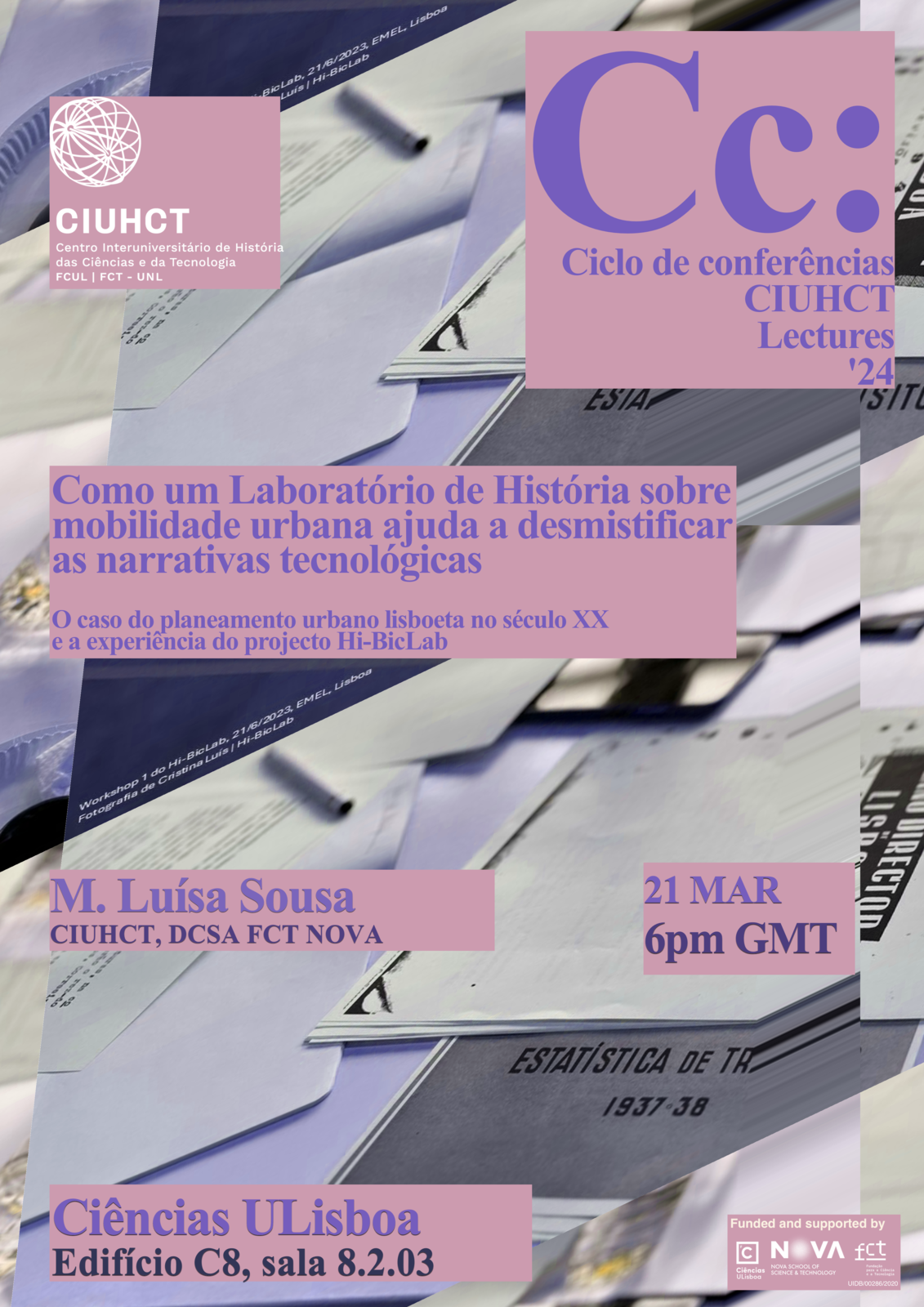2024 #2, M. Luísa Sousa (CIUHCT, DCSA FCT NOVA), "How a History Laboratory on Urban Mobility helps to demystify technological narratives. The case of Lisbon's urban planning in the 20th century and the experience of the Hi-BicLab project"
Faculdade de Ciências da Universidade de Lisboa, room to be announced soon
21 March 2024 · 18h00

abstract
In the early twentieth century, urban planners and other experts proposed to address what they perceived as an urban crisis with measures of urban expansion that contributed to future crises of mobility and spatial planning based on predicting and promoting the increased use of private cars (Sousa, 2022, Schipper et al. 2020, Norton 2020, Oldenziel et al. 2020). This presentation will discuss Lisbon's urban planning after the impulse given by the minister of Public Works and Communications Duarte Pacheco in the early 1930s, and the work developed for Lisbon by the architects-urbanists Alfred Agache and Étienne de Gröer. It will also present the results of this reflection in the research project “Hi-BicLab - History Lab for Sustainable Urban Mobilities: Lisbon's Cycling Policies”.
In 1933, minister Duarte Pacheco commissioned Agache to draw up a plan for the urbanization of the area later called the “Sun Coast”. Following Agache's suggestion to study the problem from a “broader angle”, the Sun Coast became one of the extensions of the new urban plan for Lisbon, studied after 1938 by one of Agache's collaborators, Etienne de Gröer. Both Agache and De Gröer, members of the French Society of Urbanists and proponents of the garden city concept (with adaptations), shared ideas present in the anti-urban rhetoric of the right-wing dictatorship of the Portuguese Estado Novo (1933-74), for which they worked, namely the need to combat high population densities through urban expansion based on motorized road mobility. Agache and De Gröer's prescriptions were normative and carried with them the future social uses translated into the layout of the city, contributing to other forms of mobility injustice regarding the accessible and clean (without air or noise pollution) city and the right to the public space (Sousa, 2022).
The Hi-BicLab research project brought new insights into what has been invisibilised in this process of “selling” automobility in the Portuguese capital, not only in terms of options about what data to consider in urban planning, statistics, and discourses from other sources, but also in terms of what has been preserved in archives and what has been constructed in historiography and other people's perceptions and imaginaries of the past.
about the speaker
M. Luísa Sousa is a historian of technology and mobility and researcher at the Interuniversity Centre for the History of Science and Technology (CIUHCT), and an assistant professor (adjunct) at the Department of Applied Social Sciences, at the NOVA School of Sciences and Technology of the NOVA University of Lisbon. She has been working on how the construction of the socio-technical system of automobility has shaped practices of mobility and the uses of public space, transforming streets into thoroughfares. Her Ph.D. in History, Philosophy and Heritage of Science and Technology, and in Cultural History was completed in co-tutelle (FCT NOVA and Sorbonne Nouvelle University, 2013) with the highest distinctions - approved, unanimous and très honorable avec felicitations -, and awarded a special mention in the 2017 DHST Prize for Young Scholars of the International Union of the History and Philosophy of Science and Technology, and was published in 2016 with the support of Infraestruturas de Portugal and Ordem dos Engenheiros. Her work has also been recognised by being selected as 2022 Early Career Scholar Plenary Lecturer by the European Society for the History of Science; in 2017, by the APHES (for a research article published in 2016 in the Journal of Transport History); in 2008, by the International Association for the History of Transport, Traffic and Mobility (T2M) (with Álvaro Ferreira da Silva), the 2008 Dr Cornelius Lely Prize, awarded for the best submitted paper that related history to problems of current policy and planning; a version of this paper was published in 2019 in Technology and Culture); she was International Scholar of the Society for the History of Technology (2005/2006). She was the PI of the exploratory project Hi-BicLab, on the history of urban mobility in Lisbon, for which she has recently received funding from the FCT (EXPL/FER-HFC/0847/2021) (Jan.2022-Jan.2024). She has published and presented papers at more than sixty international conferences (with scientific refereeing), at the intersection of history of technology, material culture, history of mobility, urban history and colonial history. She has experience in teaching, supervising, and editorial activities; as editor-in-chief of HoST – Journal of History of Science and Technology (2017-2020) and member of editorial committees of scientific journals (HoST, Technology and Culture, TST) and in the co-coordination of works of historiographical synthesis (co-editor of the 4th CIUHCT edited volume Science, Technology and Medicine in the Making of Portugal. Innovation and contestation, 20th century). She is a member of the most important academic and national networks in the fields in which she works (SHOT, ESHS, T2M, ICOHTEC, Tensions of Europe, STEP, APHES), having served on different scientific committees (both executive and conference scientific programmes, namely in T2M, ICOHTEC and Tensions of Europe).
luisacoelhosousa@fct.unl.pt